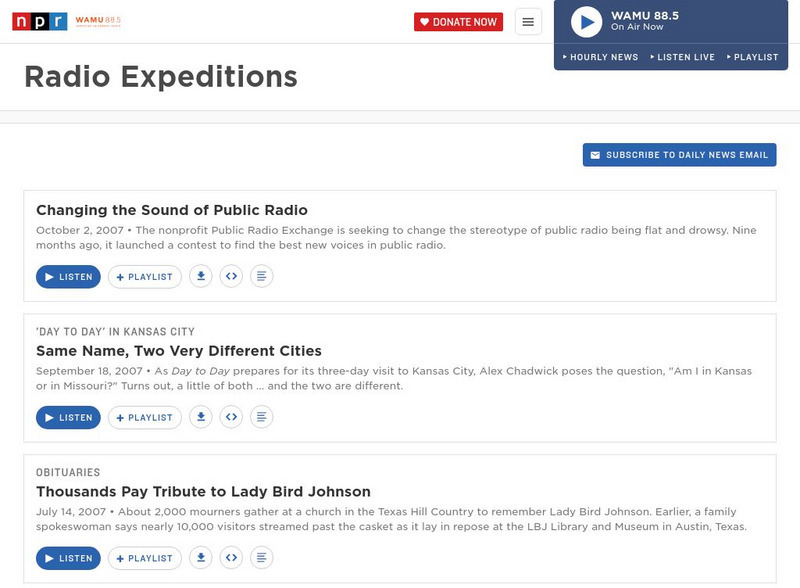Curated Video
WWII Veteran Reunited With Italian Children He Saved In 1944
97-year-old retired American soldier Martin Adler met the three siblings in person for the first time since the war.
Curated Video
Trump honors Elvis, Babe Ruth, Staubach, Page
U.S. President Donald Trump presented the Presidential Medal of Freedom to football stars Roger Staubach and Alan Page as well as posthumous medals to American legends Elvis Presley and Babe Ruth.
Curated Video
Trump honors Elvis, Babe Ruth, Staubach, Page
U.S. President Donald Trump presented the Presidential Medal of Freedom to football stars Roger Staubach and Alan Page as well as posthumous medals to American legends Elvis Presley and Babe Ruth.
Curated Video
80th Anniversary Of Japanese Internment Camps In The U.S.
Saturday, Jan. 19 marks the 80th anniversary of Pres. Roosevelt's executive order that authorized placement of 122,000 Japanese-Americans in camps.
Curated Video
75 Years After A-Bomb Dropped in Japan, Survivors Still Suffer
A-bomb survivors in Japan now in their 80's and 90's are prone to solid cancers like breast and lung cancers.
Curated Video
Behind The Lens: The Journey Documenting Navajo Code Talkers
Japanese photographer Kenji Kawano is working on a project nearly 5 decades in the making: preserving the legacy of Navajo Nation Code Talkers.
Curated Video
Endurance: Explorer Shackleton's Ship Found After A Century
In 1914, Sir Ernest Shackleton set out on a British expedition to cross Antarctica. But in 1915, the ship got stuck and the crew abandoned it.
Curated Video
97-Year-Old Reflects On Surviving The Holocaust And COVID-19
97-year-old Lily Ebert spoke to Newsy about the importance of Holocaust Memorial Day and her recent recovery from COVID.
PBS
Wnet: Thirteen: Wide Angle: Video Bank: China: Migrant Workers and Social Justice
Video excerpt [3:09] in which students learn about the vulnerability of Chinese migrant workers and their lack of power and status in a new global market economy. Includes guiding questions, background essay, transcripts, and links to...
Tom Richey
Tom Richey: European Philosophy Review With Dr. Greg Sadler
Live Hangout video discussion with Tom Richey and Dr. Greg Sadler in which they answer viewer questions on a wide range of European philosophy throughout history as part of a review for AP European history students. [1:27:05]
NPR: National Public Radio
Npr: Radio Expeditions
This resource features past radio stories that probe into interesting features of countries all over the globe.
Backstory Radio
Back Story Radio: Rules of Engagement: Ethics in Warfare
BackStory Radio podcast in which the American History Guys discuss the "rules of war" and ask, who gets to decide? They examine the history of warfare and explore war through a cultural lens for an in-depth look at ethics and rules of...
Annenberg Foundation
Annenberg Learner: Learner: Bridging World History
An inquiry-based, multimedia course aiding in the instruction of world history. Understand the impact of primary sources, time and space, human relationship, and many other aspects over the entire history of the world. Units are...
PBS
Pbs Learning Media: Global Warming: The Developing World
Thanks to technology, the world is changing faster than ever before. Unfortunately, many of these changes are probably having a negative impact on the global climate. This video segment adapted from NOVA/FRONTLINE takes a look at what...
PBS
Pbs Learning Media: Time for School: India : Neeraj
In this media gallery, follow Neeraj, from Rajasthan, India over the course of 12 years as she struggles to gain an education. [3:44]
PBS
Pbs Learning Media: Time for School: Brazil: Jefferson
Learn about the safe haven that school provides for the children of Brazil's shantytowns. [2:59]
PBS
Pbs Learning Media: Migrant Workers and Social Justice: Wide Angle
History's largest ongoing migration is occurring in China. One out every ten Chinese is leaving the rural countryside for one of China's major cities. Despite their hard work, many of these peasants are finding their dreams for a better...
PBS
Pbs Learning Media: Migrant Workers: Wide Angle
There are strict laws in China, dating back to the Maoist era of the 1950s, that prevent Chinese citizens from the countryside from working in urban areas. Harsh conditions in China's rural countryside, however, have left many undeterred...
PBS
Pbs Learning Media: The Value of a Girl: Wide Angle
Learn about Santosh Kohli, a young woman from a traditional Indian family of modest means, as she gains self sufficiency and determination. [2:53]
PBS
Pbs Learning Media: Time for School: Afghanistan: Shugufa
Visit Afghanistan to explore the home life of Shugufa, a young girl caught between the traditions of Afghani society and modernization. [2:48]
History of Our World
Podcast History of Our World: 1 Let There Be History
Rob Monaco's first podcast introduces the program and describes the intent, purpose and format, then begins chapter one, the origins of the universe. [29:31]
Apple
The History Network on I Tunes: Ancient Warfare Magazine Free Podcasts
Over 35 free iTunes downloadable podcast episodes from Ancient Warfare Magazine.
Crash Course
Crash Course World History 203: Disease!
Crash Course World History video [11:37] about the history of disease and the interaction between disease and humans.







